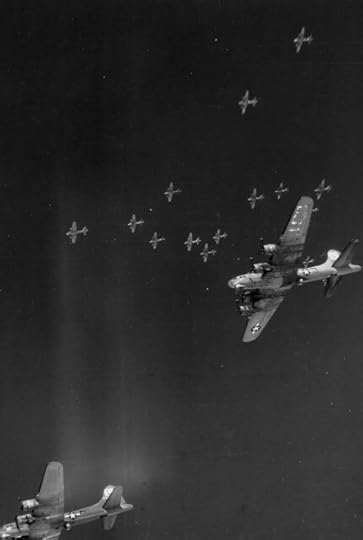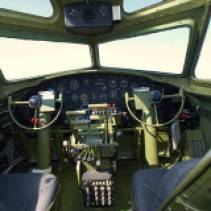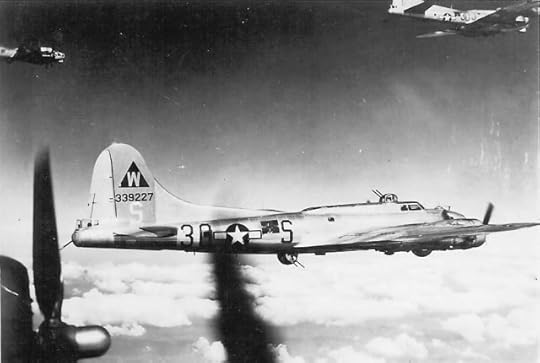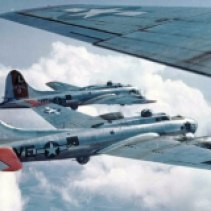Friday Feature Uncle George’s Story
We’d like to thank Liz Lemon for this. As with many WWII veterans Uncle George didn’t want to talk to us, family, about what went on. In fact, it wasn’t until going through my father’s papers after he died that I learned he had received the Asiatic-Pacific Theater Ribbon with 3 Bronze Stars and the Philippine Liberation Ribbon with Bronze Star. He never told me anything about these awards but at least we have some of my uncle’s story.
Here’s the story for this Memorial Day.
Today, I used my ears.
I met a fascinating person a couple of weeks ago, and today I asked his permission to blog about him: He agreed and seemed slightly flattered, even though I had to explain what a blog was. 
Anyway, I’m not going to use his name, but here are fragments of his “life story,” as told to me this afternoon before Bingo.
{Pardon the way it’s written. I tried to write everything exactly as he said it, and I was using a pen and paper trying to get as much down as I possibly could.}
“G,” as I’ll call him, is 92 years old, born in 1919.
He started out like this:
“My opinion is that our wars since World War II were unnecessary wars. We had the equipment and the people for them, and we found it necessary to have a war. Then we just kept going, finding little countries that weren’t living how we wanted them to live. I don’t think that’s necessary at all, but that’s my opinion. World War II had a definite reason for getting involved, because we were physically attacked by Japan. But we needed to fight another enemy at the same time. We fought for people that were denied their freedoms.
What part did I play in it? (He chuckles.) I tried to enlist in the Aviation Cadets– that was even before World War II. I could never get in because of my eyes. There was an eye test you had to go through and I always failed. I went to Butler and enrolled in Butler University.
I grew up in Greentown, Indiana. I took twelve years of schooling. I liked my school. We had interesting things. I’m a very small man. We didn’t have a football team, but I got to play on the basketball team and that’s what I liked. Our court was in the basement of this two story building.
Anyway, I enrolled at Butler University and my folks didn’t have much money; they couldn’t help me. So I got a job at school and one job paid my meals. I’d get other part-time jobs out of school that helped me pay my tuition and books, and so forth. Nevertheless, I got through one year alright. I went back to Butler a second year; I’ll never forget that.
They’d call your enrollment list and at the end I’d stand up and say that I was also going to attend but didn’t have the money. However, I eventually got it. How much was tuition in those days, do you know? Fifty dollars a semester. Can you believe that?
I’ll have to speed this up a bit. The bank and local church gave me some money and I got through one semester with that. Then the war came along. I got a job at an airplane factory at night. I went to work at night and school in the daytime. I got tired of that. So I got a draft card.
I could be a glider pilot. You’d be pulled by another plane. That could at least get me in the air, and that’s what I wanted to do.
So I went to Kentucky and enlisted in the army and volunteered for glider pilot school and got in. They sent me to two different single-engine pilot schools to learn how to glide. This one school they put an “X” on the runway and then they put you in the air, stopped the engine, and told you to hit the “X.” You hit the left rudder and the right aileron. That takes lift out from under the plane. You just drop like a rock. You just relax control and that little plane would just glide on down.
Before graduation, the colonel said this, ‘… lost gliders, lost men, lost equipment: no more gliders. We’re going back to parachutes. We’re canceling the program.’
I wanted to become a pilot, so I went to pilot school. That was six months. They threw out the eye test I always failed and replaced it with a new one. You know what? I passed with flying colors!
They took the smallest pilot (me) and put him in the biggest plane: a flying fortress, B-17 Bomber. And I became a bomber pilot. I was fortunate. I completed my thirty bombing missions with fifteen as the lead pilot.
B-17 bomber planes had crews of ten men of which there was a pilot, co-pilot, bombardier and navigator. The engineer also operated a machine gun. We had to wear oxygen masks on our missions. The worst target to go to was Berlin. Because Hitler had pulled all of his anti-air craft gunners back from wherever they were to save Berlin. My last briefing was for Berlin. I made it through.

452nd Bomb Group over Berlin on March 22, 1944
Maybe I’ll have to brag again. I was awarded the air medal five times. The air force did not exist, so the highest award was “The Distinguished Flying Cross,” and I was awarded that.

Distinguished Flying Cross
I’ve chosen to be buried in my uniform with my awards on me. People won’t know what they are, but that’s alright. I’ll take them with me.
A flying fortress could carry two, 500 pound bombs. They were heavy dudes. They’d call that, ‘mass bombing.’ One day I saw an airplane catch fire. He was almost instantly a ball of fire. We never saw a parachute leave. Ten men were lost.
I counted ninety holes on my side of the airplane one time, and none of them ever damaged anything inside.”
I interrupted him to ask him a little bit more about how he felt about the war, and he reiterated his distaste with what he knew was happening in Germany/Poland, at the time.
I asked him if he ever questioned the morals behind what he was doing, referring to the fact that he was a bomber pilot.
He said, “No. I did what I was ordered to do.”
I then asked him if he thought that people back home realized what was going on in Nazi Germany.
His response: “I often wonder.”
“I stayed in the service the whole time but I came back to the United States after thirty missions. I took a short time off and when to Indiana to get married. I was twenty-seven years old.
When the war ended I stayed in service until I retired. I wanted to do something different. I thought I knew everything, being a Lieutenant Colonel in the service. So, I took my retirement. I found out something. I didn’t know how to do a damn thing except fly an airplane.
So I went back to school and got a degree in business administration. I got a degree in Cleveland, Ohio, and I worked for almost two years, but I didn’t like it. So one day I threw away everything and went back to school.
I was in school at Southwest Missouri State and the dean of the school of business called me into his office and said he knew a group of doctors that needed a good business administrator. He asked if I would care to apply for the job. So I did. I applied for the job and I was hired. Do you know who hired me? The women’s clinic. That’s all they do– deliver babies and perform surgeries on women…. Every two years I’d ask for a raise and I’d get it.”
I asked him about his wife:
“I liked her and she liked me. So it was fit that we get married. ”
Personally, this was my favorite line. I wish it were that easy!
I know that this may not seem very important, and this accidental “interview” is sort of sporadic and without purpose, per se, but I spent a good amount of time with this man, and honestly, he’s way more interesting than any textbook I’ve ever read.
Whether you read this or not, I felt that it needed sharing.
I hope that someday I have interesting to share with whoever takes the time to listen.
Oh. Did I mention that he is now blind?
Cheers,
Liz
NOTE: If you haven’t figured it out this was recorded in 2011. Uncle George has now moved on to heaven where we believe he can once again see the blue sky he loved to fly. And yes, he was buried in his uniform, with his metals and with full military honors.
On this Veterans Day be sure to thank a veteran. They are who keep us free.






